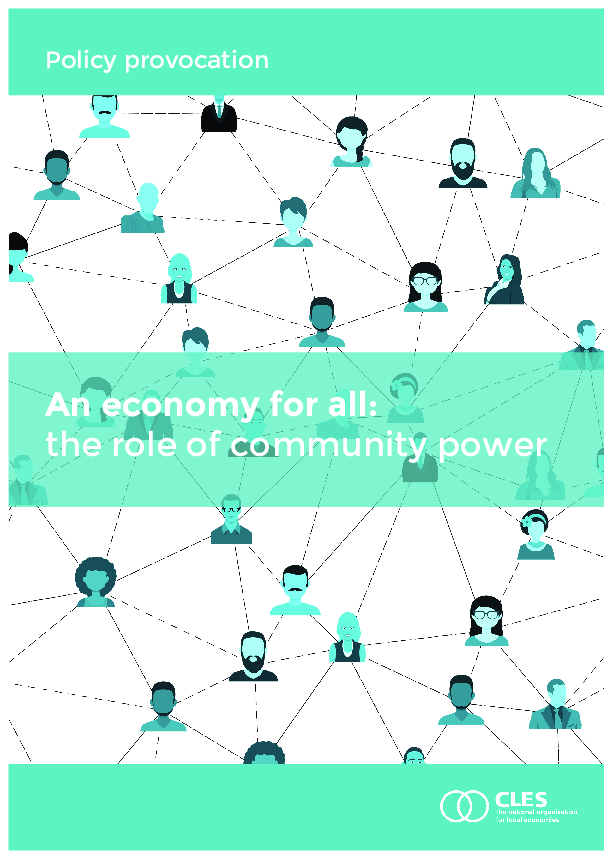CLES counter the ‘dangerous’ community paradigm
Posted on 26 Feb 2020 Categories: News, Reports
 The Centre for Local Economic Strategies (CLES) have published a new policy provocation, An economy for all: the role of community power, which questions the calls ‘for communities to be front and centre in the delivery of more local and national public services’.
The Centre for Local Economic Strategies (CLES) have published a new policy provocation, An economy for all: the role of community power, which questions the calls ‘for communities to be front and centre in the delivery of more local and national public services’.
The provocation begins by looking at the ‘problems we face’. First, a vulnerable welfare state undermined by a ‘series of deregulations, private sector management techniques, outsourcings of public sector goods and privatisations’. Second, austerity ‘has exacerbated inequality and poverty’, with the places most in need receiving the least resources: the report states that ‘spending in the poorest 20% of English councils reduced by £278m in 2016-17, but increased by £55m in the richest 20% of councils’. There have been huge cuts to public services, alongside an increase in demand for social care, both due to the ‘deep social and economic problems accrued through the cuts themselves’ and a wider demographic shift.
According to the provocation, various publications have recently been advocating for a ‘new form of local public service delivery’, leading to the emergence of the ‘community paradigm’. Its fundamental principle is:
‘to place the design and delivery of public services in the hands of the communities they serve. In this way, a new, egalitarian relationship can be built between public services and citizens … one that enables the collaboration necessary to shift to prevention; one that requires communities to take more responsibility for their own well-being; and one that means citizens and communities can genuinely “take back control”.’
The provocation counters this proposed paradigm with various points. First, it argues that while ‘a dominant marketisation and austerity strides over the state and our public services’, putting these services in the hands of communities will only ‘serve to deepen marketisation as they are forced to compete for scarce public resources’. Second, it points out that the paradigm echoes the coalition government’s ‘Big Society’ scheme, which ultimately failed to deliver. The Final Big Society Audit, published in 2015, concluded it ‘has not reached those who need it most. We are more divided than before.’ It then puts forward the notion of the ‘new municipalism agenda’, which seeks to shift power to the people, but not ‘pass the service delivery buck to hard pressed communities’. The provocation states that ‘new municipalism does not believe the state is discredited’. To imply
‘that the state paradigm has had its day and that a new community paradigm is emerging in its place is misconceived, if not dangerous, especially for those communities most in need of decent public services and a social safety net.’
It then goes on to argue that ‘true system change does not ignore the wider political economy’, whereas the community paradigm still operates within the ‘austerity-framed ideas of public service reform’. Finally, it makes clear that while critical of the community paradigm, CLES support genuine community power and meaningful community involvement, as long as it is ‘never seen as an alternative to the state’.
The provocation then asks ‘what should be done?’ It calls for an overhaul of the voluntary, community and social enterprise (VCSE) sector and ‘true system change that addresses austerity coupled to the meaningful democratisation of the private sector’. This includes properly funding public services, a ‘fairer funding settlement for the whole of the UK based on local needs’ to address regional inequalities, and empowering communities to be more involved within the commercial economy.
The provocation concludes that the answer to our ailing public services is not ‘the divestment of already debilitated public services to impoverished communities under a community paradigm’.
‘The real prize lies … in growing new forms of citizen democracy and ensuring greater community and democratic ownership models within the wider private sector.’
To read the full provocation, click here.
